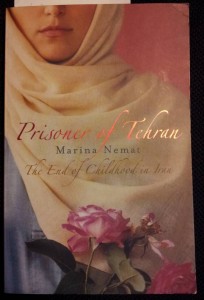I was listening to some radio last night and they were talking about Peter Greste, a journalist who has been jailed in Egypt on charges of spreading false information. I didn’t hear much more as I was instantly thinking about what his conditions might be like and promptly transported back to a book a recently reviewed. A Long Walk Home by Judith Tebbutt was about her kidnapping, imprisonment and finally her release, it is an amazing work with many details of the conditions of the buildings she was kept in, as Greste is in jail I should really have been thinking of the conditions Marina Nemat endured in her book Prisoner of Tehran.
Growing up in Tehran in the 1070s, Marina Nemat enjoyed an idyllic childhood. But when the Iranian Revolution reached its height in 1979, Marina’s world changed for ever.
After complaining about her maths lessons being replaced by Islamic studies, Marina was arrested late one evening. She was taken to Evin, a notorious prison where interrogation and torture were part of the daily routine. Aged sixteen, she was sentenced to death. Her prison guard snatched her from the firing-squad bullets but exacted a shocking price in return: marriage to him and conversion to Islam. Martina lived out her prison days as his secret bride. But then her world changed once again for ever.

This book really resonated with me. Nemat is about the same age as me but I grew up surrounded by books and allowed to read whatever I could, I grew up in peace without even the idea of war on my own land let alone my doorstep. Nemat grew up with a family who didn’t encourage her reading so she had to go to great lengths to obtain books, war was not only on her own land but on her doorstep. She watched her boyfriend killed on video months after it happened, then stood up at school and protested about being taught Islamic Studies instead of Maths knowing this action could be dangerous and it most definitely was. Some months later she and all the people who protested with her were arrested and somehow Nemat survived.
This is an amazing story and one that should be widely read. Unlike books such as Tomorrow When the War Began by John Marsden it is real and Nemat makes it seem incredibly real. She tell us what it’s like living in a country where your religion is a minority and that at times you have to wear what they tell you and cover your hair. The author gives us the inside picture of what the prison cells feel like and how many people are crowded into the one room. The rooms and building are probably fairly similar to those Greste is in at the moment and so this is what I should have been thinking about rather than a shabby room in South Africa.
Prisoner of Tehran is an important book to read, it is well written and hangs together nicely and I recommend it wholeheartedly.

